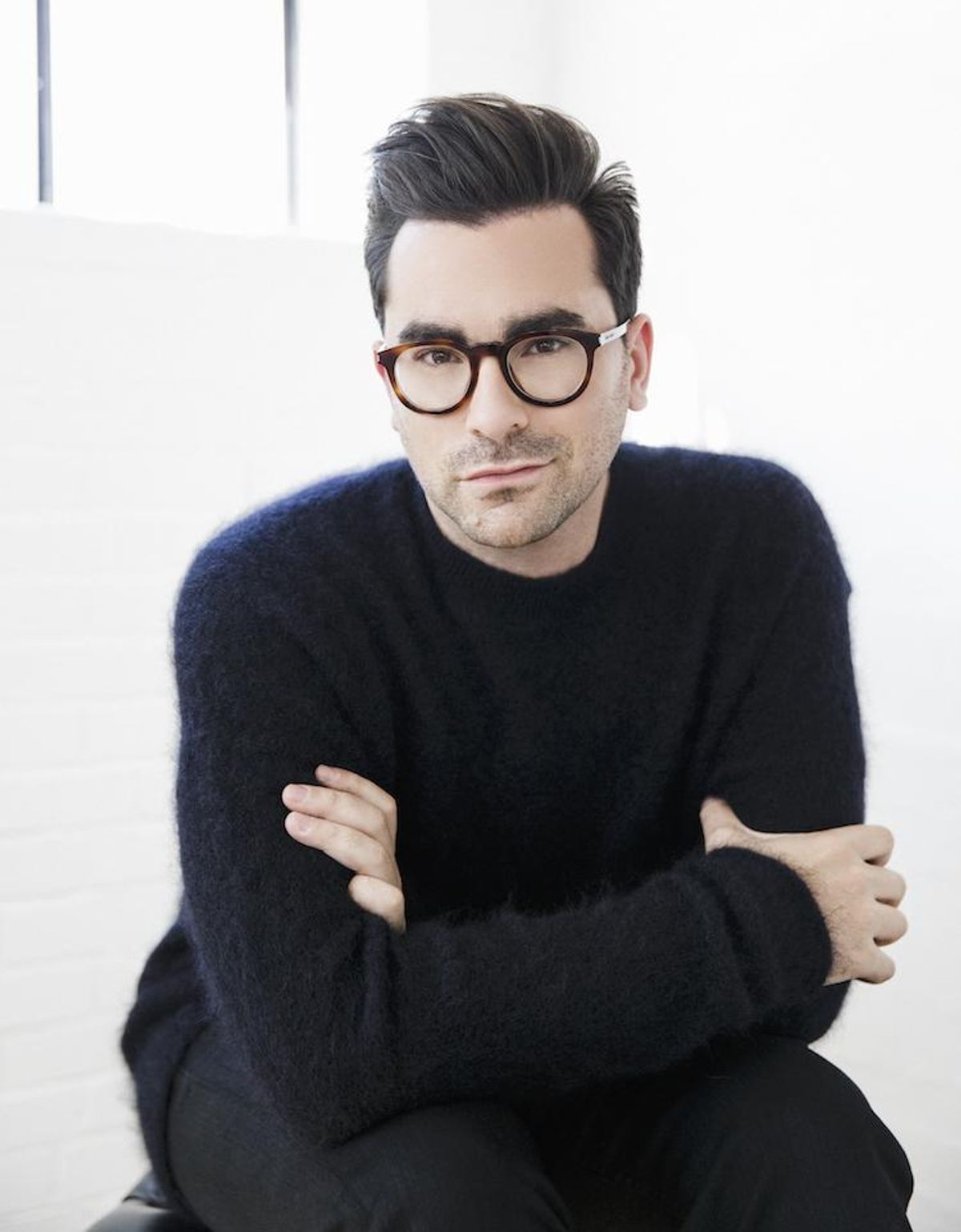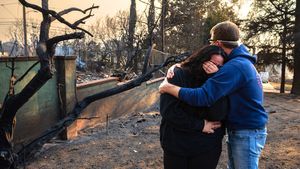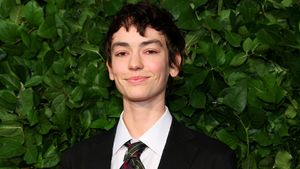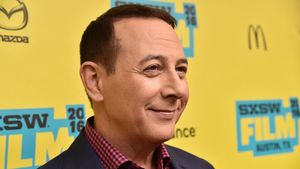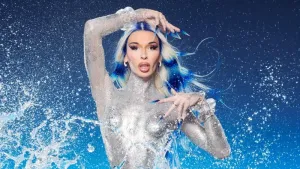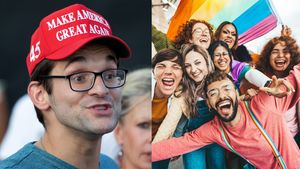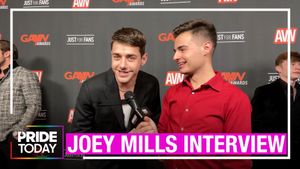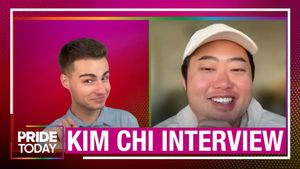You may recognize Daniel Levy from his original comedy series on Pop TV, Schitt's Creek, which has recently begun airing it's fourth season. Levy is the creator, writer, and star of the Canadian sitcom, which has won 11 Canadian Screen Awards and received another 15 nominations, as well as picking up 3 Director's Guild of Canada Awards. Still not ringing any bells? Then you'll definitely know Levy from his eyebrows: the same as his father's, Eugene Levy, who co-stars with Dan in the show.
Eugene, the celebrated actor known for his roles in Christopher Guest's improvised films and the American Pie franchise, did not raise his children in the glitzy, glamorous world that many kids of the entertainment industry enjoy. Instead, Dan and his sister (who also appears in the show) were mostly raised in Canada, away from the temptations of LA. By 15, Dan had begun working, and that spirit of independence would prove a throughline throughout his career. A hard worker with a passion for storytelling, Dan never wanted anything handed to him.
"I think I was very fearful of that headline," he explains. "That I'd somehow weaseled my way into this through my dad, who, god love him, is not a mover and a shaker. He likes to stay home and eat sandwiches."
And so he created the idea for Schitt's Creek: an incredibly wealthy family of four (the father runs a Blockbuster-like movie service and the mother, played by Catherine O'Hara, is a B-list soap actress) loses all of their assets but one: the deed to a tiny town they bought while at the height of their prosperity simply because they thought the name of the little locale was funny: Schitt's Creek. With nowhere else to go, the Kardashian-like foursome move into the little village to live at the motel, where, naturally, shenanigans ensue.
Related | OUT 100: Dan Levy
Schitt's Creek is a very funny show, and happens to feature a sexually fluid main character, David, played by Dan, who himself is queer. But what makes the role remarkable is the offhandedness with which David is written--there's no preachy "Gay is OK" storyline. Instead, being gay simply is OK. In this world, sexuality is not an issue--so much so that barely anyone even bats an eyelash that David is interested in both men and women.
We sat down with Dan for a delightful chat about how Schitt's Creek came to be. While conversing, it became clear that Levy is the very antithesis of his brand-obsessed, vapid character, instead speaking with a powerful intelligence that revealed just how deliberate each choice he made in creating this series truly was. We discussed everything from growing up in the shadow of a famous parent, to writing gay characters, to figuring out what it is you truly want to do in life, and then doing it.
Read on to find out more:
OUT: How did the show happen? It's so strange--whose idea was it?
DL: It was my idea. I'd been hosting at MTV for a long time. I did one of the original after shows for a little MTV project called The Hills.
I've heard of that, actually.
It was a thing for a while. About a group of girls in Los Angeles who liked to push food around a plate. A lot of interns. And through that process I was able to narrow down what I didn't want to do with the rest of my life. Every door that closes leads to a slightly narrower door.
Until you get to a door you have to slither through.
That was a terrible analogy, but you get what I'm saying. So I came out of hosting MTV knowing I was not cut out for entertainment reporting. I knew I wanted to tell stories, and I didn't know if that meant I was going to write a book, or I was going to write a play, or if I was going to act, or what was going to happen.
But there was a moment--and I don't know where I got this emotional clarity at 27 years old--but I thought, 'I'm going to put all ego aside. And moving forward, if I didn't care about what people thought, or had to answer questions about what I'm doing now, what would I want to do?' And I started writing this sort of small nugget of an idea of a family that lost all their money. And at first we hadn't finessed it in any way. I think it was also at the advent of Real Housewives and Kardashians. There was a lot of money around, being presented culturally. There were these lifestyles that people thought were aspirational. In a way, I guess, they are, depending on the values you have as a viewer.
So as a result, I asked myself 'What would happen to a family like this if the money was stripped away?' So with the Kardashians, there's a real love inside that family, but with this family on our show, there's much less intimacy. But it was really about: what is a relationship that has been so tightly associated with money and superficial bandages that have been easily remedied by swiping credit cards... what do these people look like with nothing?
Your dad is famous--was this idea at all based in the idea of "What if this happened to my family?"
Our family is close, and we care about each other in a way that this family--I feel it's very foreign to them. But I did grow up--summers were spent in Los Angeles, and my dad kept us in Canada for most of my life because he didn't want us exposed to highly to the LA culture. And I avoided rehab because of it.
But families I've seen and witnessed in the LA world, where whenever there's any kind of conflict it's like: 'Take yourself to the spa. Take yourself shopping.' I've sort of always clocked that because my parents didn't raise me like that. I've been working since I was 15, and have paid my way for virtually everything. I think what you get out of that experience is an ability to understand how rewarding it is to pay for something yourself. To earn something. To want to take a trip, and save, and feel what that's like. That world of disconnection between earning something and having it be given to you--that I thought was a really rich are to explore.
And we just started talking about it. My dad--I came over to the house one afternoon, and we started talking about what that idea could be. At first they were in frozen foods. Frozen foods is still a thing, if not bigger than ever. I lived off of Lean Cuisine.
Trader Joe's frozen section is the only thing I buy.
The chicken pot pies are very delicious. And the flatbreads.
I'm going to ask you to try the dumplings. Pork gyoza.
Thank you so much, I'll follow up on that after this is done. But then we thought--something like a video store situation is good because they became sort of irrelevant, and then on top of that what was something funny that could have happened to them when they were in their prime, and buying this town was something we thought was very funny. The title of the town was so disturbing that they just bought it for the sake of putting it on their wall. The deed. And then to move them there, and strip it all away. Once we got into that territory, we realized there was a lot of relevancy in that situation, just culturally.
The whole world of middle America...
Yeah, and I think there is this desire to see the one percent fall. Except we wanted the outcome to be love, and not hate. It's a safe space show.
I watch it when I don't want to be sad.
Which is nice, because I've noticed in the past year, coincidentally, since something happened in the government, that the response from people has gone from 'Oh, it's funny,' to 'Thanks for making me laugh.' It's kind of intense. Incredibly flattering, but also we're realizing more than ever that as humans we're requiring things for our wellness now.
It's scarce, these days... the joy.
Yes, and it's always intended to be joyful. It was only when we started pulling back the layers on this family that we realized there's a really tender through line of these strangers coming together and realizing love does not require any financial compensation. And once we struck that chord I think it really sent us on a nice, clear trajectory. In terms of season after season.
It's interesting, the idea of a rich liberal moving into the Republican, rural region and realizing how all these characters are good people.
It was always a concerted effort to never make the small town be the joke. Because I think so often small town life... it's an easy sort of trope. I wanted this town to be hyper-accepting. It's the most incredibly open-minded place, and I think it's because I had the reigns of what I'm creating, and I'm going to put out into the universe this utopic world where I feel it's just as it should be.
And we're just exploring my character's (David's) relationship now, in the fourth season. But we never wanted it to be a thing. We never wanted acceptance to be in question.
Right--like "Is gay ok?" No, it is. We know at this point.
And everyone is ok with it.
And also that he's just fluid. I haven't seen that anywhere else on TV.
I didn't know that at the time, but it's been brought to my attention. It felt like a relevant conversation to have. And that character, for us, it felt like a natural place for him to come from. Because I think sometimes you can feel almost a strategic character--certain characters are placed in television shows to teach the audience a lesson.
And this character is not about communicating "It's ok to be gay." It was a funny character who happened to be gay.
Exactly. And it came from a very authentic place, of how we've managed in a way to inform people without the audience feeling like they're being taught a lesson. It really has been by setting an example, and people osmosising that into their own lives. That's the biggest feedback I've gotten. I've been saying since day one that it's a story about love, on all levels, but primarily about these four people. Who had never really known what it was in its core, base level. It's an interesting thing when the touching moments, and the moments when people are saying they were really moved, are when someone smiled at someone. I'm thinking, 'What kind of a strange dynamic have we set up where the faintest glimmer of respect or love is met with an emotional well-up?
Had you always known you wanted to work with your dad?
No, for a long time I didn't, and chose not to. I got a job on TV when I was 19, and made a very concerted effort to not talk about it, and I never talked about it. I think there is this cultural naivety about what it's like for children who happen to go into their parents' profession in entertainment. It happens all the time--doctors, lawyers--and that, somehow, is fine. It feels like entertainment is one area where if you've been raised in this world, it feels like a natural curiosity to pursue. Having a parent in the industry maybe gets you a meeting somewhere. In a way anyone would take a meeting. If you have a friend, and you work in fashion, and they get you an interview with a designer, you take that interview.
That's how so many people get jobs. From knowing someone.
And from showing up, and doing a good job in the meeting. If you prove yourself. Like anything, if you show up, and drop the ball, or don't have the experience or talent or whatever to make someone want to invest, they're not going to invest. So I think I was very fearful of that headline. That I'd somehow weaseled my way into this through my dad, who, god love him, is not a mover and a shaker. He likes to stay home and eat sandwiches. He's the sweetest, gentlest soul. But he's certainly not someone who's like, 'MEET MY KID!' I got to a point where I felt comfortable enough with what I could bring to the table, where I could approach him, finally, at 29, and say what I think his sensibility, what he'd brought to the Christopher Guest movies he'd been in... there's such a tenderness that my dad brings to everything he touches. And he values the fact that you can be funny and kind.
And a lot of people think you have to be mean.
A lot of people think you have to be nasty. And dark. Which can be funny, but where my dad has found his niche is showing that lightness can also be funny.
Did you grow up knowing Catherine then?
Yes. She's an insane genius person. Everything she touches, with a nonchalant touch--it's not a heavy-handed thing, because everything she does is so effortlessly. And Catherine, much like my dad, plays a character that is antithetical to who she is in real life. Very under the radar people.
I can already tell from talking to you that your'e nothing like your character. But are there any similarities?
In a strange way I feel I've learned a lot from this person, and it's weird because it's all coming from the same well. I write this person and then I act this person, but the process of acting this character often reveals more than I had anticipated when I wrote it. And I also think that I am actively working to be as comfortable as David is. Even though he's incredibly uncomfortable. But he's uncompromising in who he is.
David enters a relationship with a new man this season--my favorite thing about how those two interact is how it just feels very real.
Thanks. That's the highest compliment you can get. Because I think at the end of the day...I don't want to say there's a certain level of responsibility when you're telling a queer story on TV. Because it is inherently a queer narrative. But at the end of the day, it's treated like two people who love each other. I always thought you wouldn't treat a straight relationship with a heavy hand. Or with some sort of underlying message. Why would you do that? I understand that there's a whole world that needs to be explored. Cracked open in the mainstream.
But if you're exploring it with a heavy hand, then people are going to see a heavy handed thing that's not enjoyable as much.
It becomes a thing. I really feel like we're social creatures. We watch and learn. There's been kids that have come up to me on street and said that the way that my family, my character, has informed their own family and made it feel more comfortable. They're able to have conversations in their home that they weren't able to have before, because they're watching it on our show. And it has normalized the experience and created a safe space for their parents to feel like they're not alone in this.
Well the show is obviously about family. It feels like a family affair.
We really, as a group, really truly love each other. It's so fun. Because I've heard horror stories of other shows where people act opposite, tennis balls on sticks, because they can't be in the same room with each other. We're all just dressing up and playing clown. If you're not enjoying yourself doing this, there's something mentally incorrect about your makeup.
